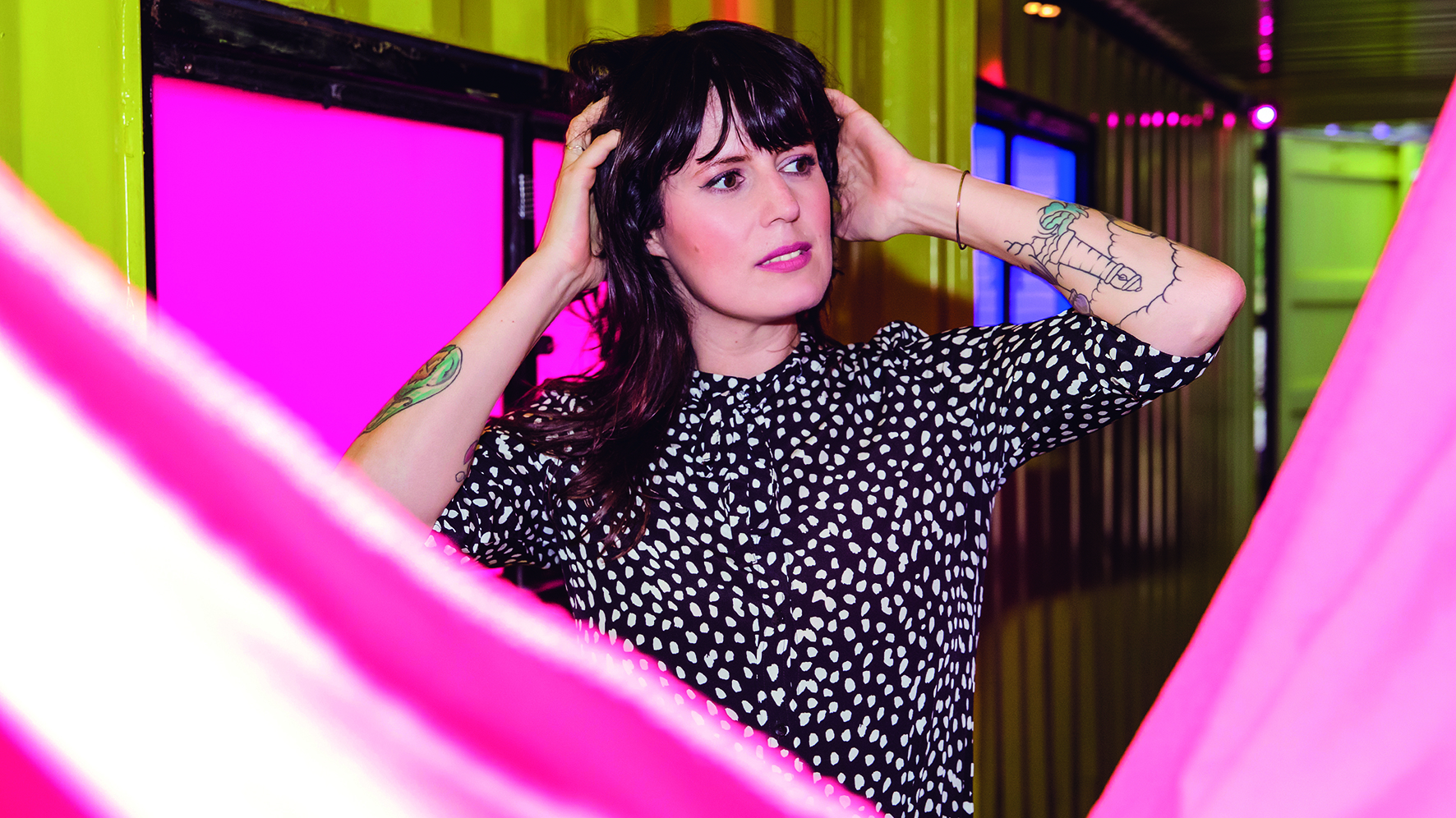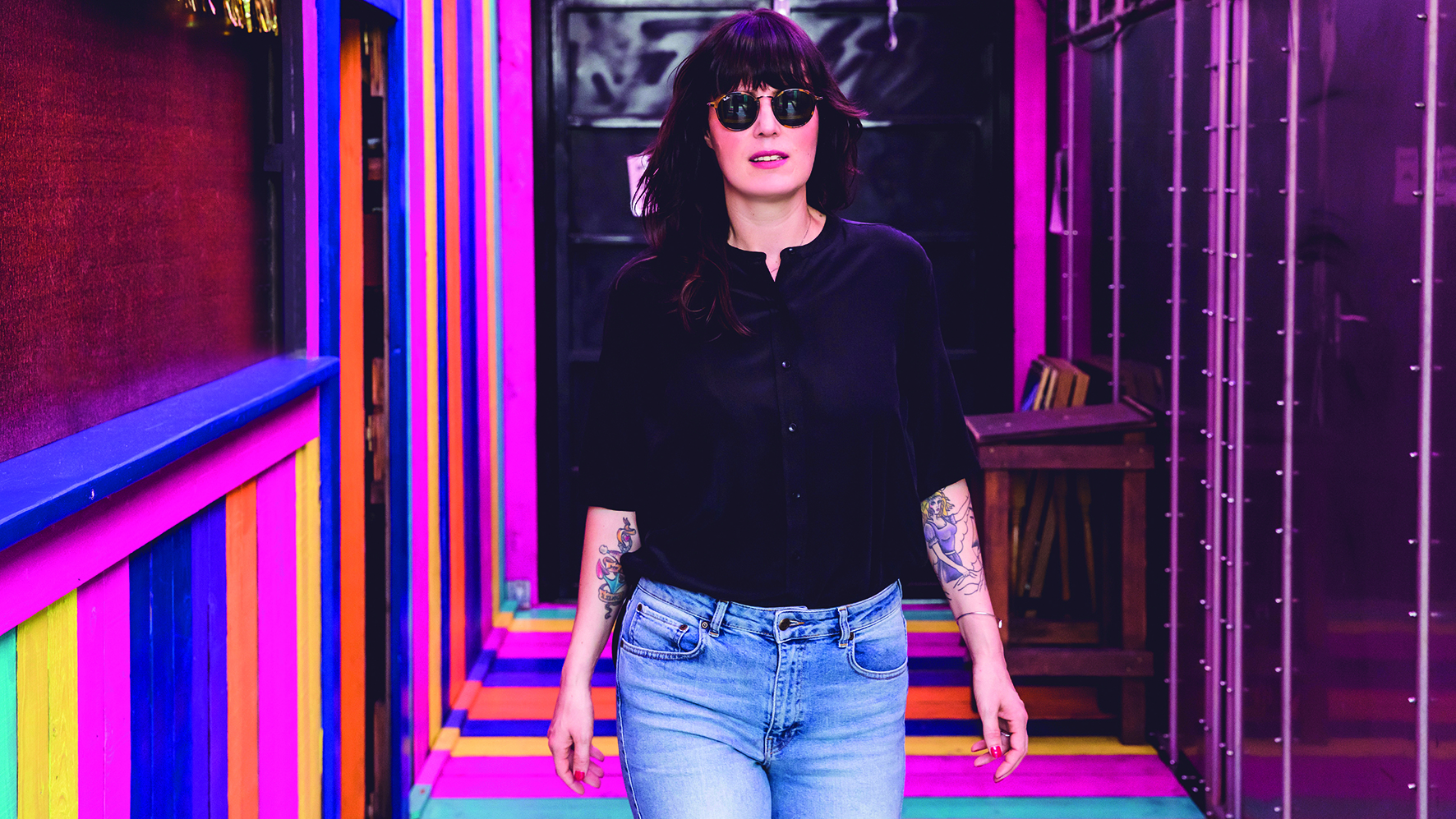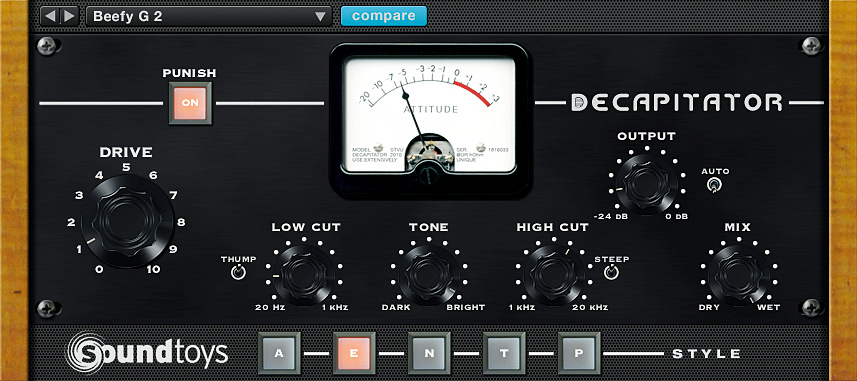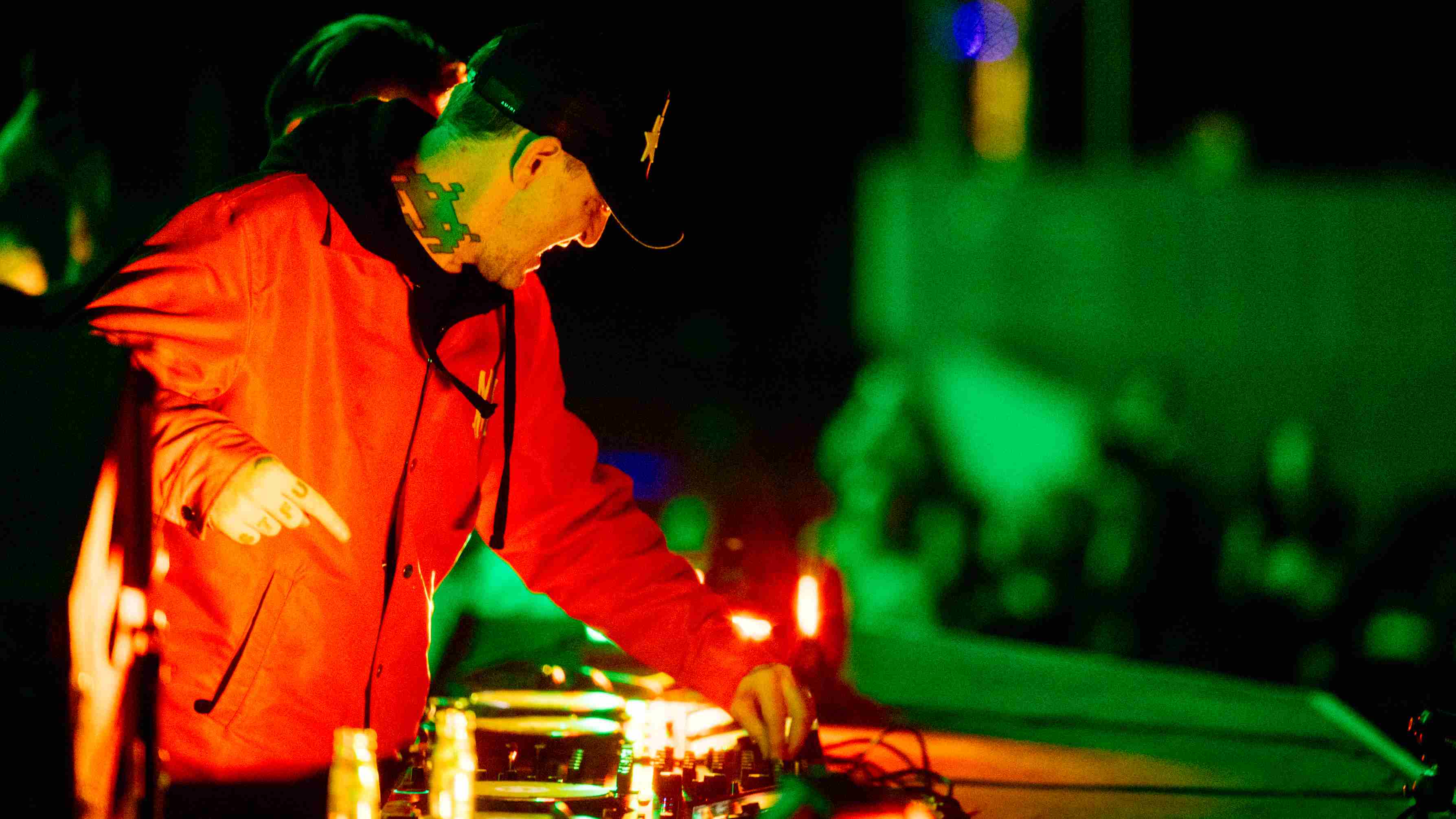Cinthie: "Bassline and kick drum are the most important things in dance music"
The Berlin-based producer and DJ on the vintage synths and drum machines behind her new album on Aus Music

Berlin-based DJ and producer Cinthie has been immersed in the city’s electronic music scene, not just as a music maker but as a label owner and, right at the opposite end of the scale, working for music software icons Ableton as a day job.
Since being inspired by early electronic tunes in the mid 90s, she has become an in-demand DJ, touring across the globe, but her passion also lies in music production and she has built a stunning studio merging the best hardware – described as “a wide spectrum of some of the most noteworthy vintage drum machines and synthesisers in existence” – with the latest plugins to produce her own unique house and techno tunes. These have appeared on her own label, 803 Crystalgrooves, while her debut album, Skylines – City Lights, came out on Aus Music in 2020.
And her computer music history? It all started aged 11 on a Commodore…

When did you first get involved with music production?
“I’ve always been really interested in music, and when I just started to shape my taste in music as a young teenager, one of my cousins gave me a tape by Sven Väth. That must have been around 1994 and it contained all kinds of music ‘cause at that time Sven was playing early electronic music, EBM, and a lot of obscure stuff but I loved it. From that time, I started to dig deeper into electronic music and in 1996 I started working at a record store called Humpty Records. And the rest is history…
“I got my first gigs and released my first records in 2000 and stuck to it, although I had my ups and downs, but I guess that’s normal. The reason why I love music or electronic music in general, is the music itself, because it makes my hips move and always puts a smile on my face, but I also love the community behind it.
“I mean it’s now a lot bigger than back in the day but being united with so many different people on one dance floor, that was pretty unique back then.”
Get the MusicRadar Newsletter
Want all the hottest music and gear news, reviews, deals, features and more, direct to your inbox? Sign up here.
When I first started making music, I used an old Atari with Cubase 2.0
When and how would you say you became successful, or at least able to make a living from music?
“That was in 2014. I was still hammering a 40-hour a week job at Ableton, had my child, the label, and was doing the gigs etc. It was simply too much, and I said to myself: ‘OK now or never’. I quit my day job. Luckily, I had a few coins saved up to be able to survive at least one year without gigs and even more luckily, I had enough to pay all my bills and even put a bit on the side for the not-so-good days.”
What is your overall philosophy or approach when it comes to producing your music?
"It’s always very different. You may have seen my studio with a lot of vintage hardware classics. I have my few favourites, but I also always try to get out of my comfort zone. Usually I start with drums; I prefer my 909, because you can easily jam a quick groove out. Then second is usually the bassline and once I have the bassline, I see in which direction it goes.
"But sometimes I start just with a vocal I have found and build the track around, or I do a drum machine workout and do more like a Steve Poindexter-inspired track… I would say that it really depends in which mood I am.”
Bassline and kick drum are for me the most important things in dance music
When and how did you discover the route to computer music-making and how has it changed the way you work?
“When I first started making music, I used an old Atari with Cubase 2.0 and had one synth – a Yamaha AN1X, I think. I’m not sure where I got it from, but this was it. No YouTube, no tutorials, no friends who I could ask. But it was definitely easier than with the 505 production station I had from Roland.
“It must have been around 1998 when I first started making my first steps in computer music. I must admit that I already started a bit of baby coding when I was 11 on my dad’s Commodore, so I had already quite a good knowledge about computers but not so much about music programming. It was a very long learning process but worth it.
"For many years I worked with Logic or Ableton but only a few years ago I decided to use more gear as I thought I was moving the mouse around more than making music. Now it’s very combined and I jam with machines, record them, or correct some notes in the editor. Overall, I can say it made my workflow a lot easier.”
Tell us about the rest of the gear that’s in your studio.
“OK, let me think about where to start. I have a big thing for drum machines, so I own most of the Roland classics such as the 909 (which is my favourite) the 808, 707, 505 and some other drum machines like the Casio RZ-1 or the Yamaha RX7.
"Then I own a Roland 101 and the 202, a 303 clone, Orbit, a few other Yamaha synths like the DX21, the desktop version of the DX7 which is the DX200 I believe, Oberheim Matrix, a Moog clone from Behringer, the Model D, Roland D-50, Juno 106, Juno 06, the Behringer Monopoly, ESQ1 and a few more things.
"Also, I want to add that, of course, I don’t need all these things; you can make music just with the computer but for me personally it’s just more fun. Sometimes I’m just in the studio fiddling around with one machine.”
What are your favourite five plugins?
“The Arturia V Collection because it mirrors most of the gear I have in my studio. It’s very easy and useful for when I’m touring, and I want to sketch a quick idea or when I’m at home or just want to try out some things.
“Fab Filter Pro Q. I just love their EQ. It sounds so good, and I also love to use it when I’m not in the studio. It’s precise when you want to cut out some funny noises but keeps the brilliance of the sound.
“Native Instruments Massive. This has been my go-to synth for many years. If you know how to use it with assigning all the macros and envelopes, it’s endless fun and you can come up with some weird sounds if you want to. I really love it for sound design, but I must admit I did not use it in a long time.
Once the hi-hat and groove kick in, I can almost already hear a bassline
“u-he Diva. This synth has also been one of my go-to synths for a long, long time. One of my friends recommended it to me and I instantly fell in love. Easy to use with lots of parameters to edit your sound.
“Slate Digital series. I’m loving their collection for mixing, especially the EQ and the compressor which makes everything extra juicy. Mixdowns are not really my favourite thing to do but with these it’s very easy. One of my friends once recommended them to me and showed me how he is using them, and I adapted it for my own music.”
How do you typically start writing tracks or initiate projects?
“I have different starting points. It’s often the drums I start with: I prefer the 909 to jam out a quick drum loop and once the hi-hat and groove kick in, I can almost already hear a bassline.
"Bassline and kick drum are for me the most important things in dance music, and I try to make sure that they sit nicely together and give my tracks some movement. But sometimes I start with the bassline or more often with some chords and then build a track around.
My biggest production trick is to put a saturator on almost everything
“In a few cases I have a nice vocal which I want to use. I try to look for the key and start writing a bassline around it. Once I have the bassline, it’s usually quite easy to come up with chords.
"But of course, every now and then nothing comes out from my day at the studio. It’s normal but I usually keep the ideas, good or not and come back to them. Once I have the basics of my track, I start arranging them and add what’s missing, maybe a nice arp or synth line, pad, high string or an acid line. Just some of the ingredients of a good house track.”
What advice do you have about completing tracks?
“I just listen to my feelings. I love it when I only use a few instruments and it’s already grooving after the first 30 minutes I’ve worked on it. If it’s not grooving after that I know it won’t start grooving suddenly later.
"So usually, I follow my feelings if I want to know if a track is done or not. Sometimes a track is solid but needs variation. Then I usually add one more thing to give it movement. I recommend not overdoing it and adding too many things; later in the mixdown it can get muddy.”
How cool would it be to just take your ideas from your brain into your MIDI devices?
Talk us through one or two of your production tricks.
"My biggest production trick is to put a saturator on almost everything. It gives my productions extra crunch, especially when it comes to drums. I love my drums almost too saturated especially when I do more Chicago-house-influenced stuff. That’s one of my signature things in my tracks: saturated drums.”
Do you ever collaborate?
“I never really did a collab to be honest. I love to work on my own as I feel like I can be nerdy when I’m in the studio and I even start talking to myself or my machines. But my boyfriend asked me to go to the studio together, so I guess I will probably try that first because I feel really comfortable with him.”

What’s on your wish list?
“A Roland Jupiter-8 would make my collection complete. I swear. No more other gear after. Really. I swear. Promise!”
What would you like to see developed in terms of studio technology and why?
“Johannes Heil made a track years back and called it ‘Reality to midi’. I’m still waiting for people to develop this. How cool would it be to just take your ideas from your brain into your MIDI devices? Otherwise, I believe there is already enough gear on the market and for me personally I have everything I need.”
What advice can you offer others who are starting out in music production?
“Take your time and learn your gear in and out. A good solid DAW is enough to start fooling around and you can always upgrade your gear.”
And from the music industry?
“Also take your time. A lot of people think being big or at the top of the game is the goal. But the way up is the fun. Let it grow naturally and you’ll have a lot more fun and respect in the music scene.”
Tell us about your latest release?
“Before Covid I planned to go on tour with my album Skylines – City Lights which was released last year on AUS Music. I was excited to play all the tracks and present them on tour but then the virus hit us all. I’ve now produced a few solid remixes which I love to play on tour and my new release Free Fall will come out on Shall Not Fade this month.
"I’m super excited to play out the tune, I’ve road tested them already but soon I’ll finally have the records in my hands. The record contains four tracks, all made for dancefloors. People should come and see me if they want a dance and a good time.”
What else do you have planned?
“I’ve got one really, really big project in the pipeline I had on my wish list for a long time. It’s finally happening early next year but I’m not allowed to announce it yet. So sorry for the teasing. Otherwise, I will spend most time again in my studio in autumn and winter to have new music ready for the club season.”


Computer Music magazine is the world’s best selling publication dedicated solely to making great music with your Mac or PC computer. Each issue it brings its lucky readers the best in cutting-edge tutorials, need-to-know, expert software reviews and even all the tools you actually need to make great music today, courtesy of our legendary CM Plugin Suite.
"At first the tension was unbelievable. Johnny was really cold, Dee Dee was OK but Joey was a sweetheart": The story of the Ramones' recording of Baby I Love You
"Reggae is more freeform than the blues. But more important, reggae is for everyone": Bob Marley and the Wailers' Catch a Fire, track-by-track










